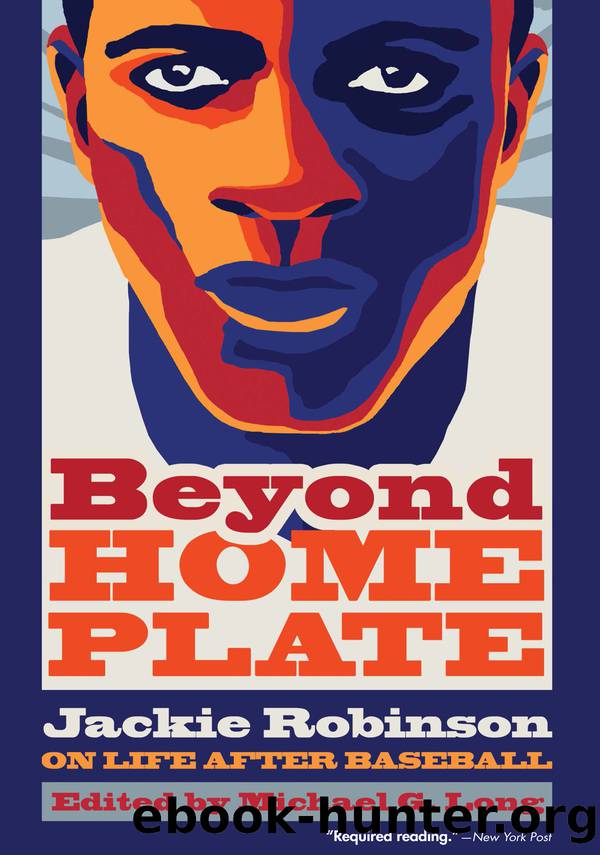Beyond Home Plate by Long Michael G.;Long Michael G.;

Author:Long, Michael G.;Long, Michael G.;
Language: eng
Format: epub
Publisher: Syracuse University Press
In Defense of Student Sit-Ins
On March 19, 1960, former president Harry Truman made the following comment on the student sit-ins under way throughout the South: âIf anybody came to my store and tried to stop business, Iâd throw him out. The Negro should behave himself and show heâs a good citizen. Commonsense and goodwill can solve this whole thing.â1 Several days later, Truman reiterated his position after two officials of the Detroit NAACP had asked him about it. âI would do just what I said I would,â the former president added. âNAACP is an organization which has been working for goodwill and commonsense in this situation which we are facing today. When they do things that cause people, who have been friendly to them as I have been, to feel that they are doing the wrong thing, they are losing friends instead of making them.â2
Source: New York Post, March 25, 1960, 96.
FORMER PRESIDENT TRUMANâS OUTBURST at the NAACP is a sad commentary on the man who, in 1948, gained the whole worldâs respect for thrashing the Dixiecrats. That he should now choose to attack those who are so valiantly fighting bigotry, rather than the bigots themselves, is regrettable but insignificant. For Negro Americans are determined to obtain their full rights and human dignity no matter whose voice is raised against them.
If Truman really means that he would âthrow outâ any of the quiet, orderly, peaceful students for merely asking to be served at a public lunch counter, then I suggest he open an establishment and prepare to begin at once. It is not the students who are âstopping businessâ in these stores. The managements themselves have closed their counters, rather than choose to sell Negroes sandwiches as well as toothpaste.
In point of fact, Negroes in the South do not now have the opportunity of âshowingâ they are good citizensâas if any American should be required to prove the point to begin with to receive his âinalienable rights.â Barred from the basic right of a citizenâthe voteâand hemmed in by restrictions on opportunities for education, jobs, housing, culture and every other activity, it is little short of amazing that Negroes have âbehaved themselvesâ as well as they have. It is also ironic that Truman set up no such requirement before sending his âgreetingsâ indiscriminately to millions of Negro Americans to fight and die for their country in World War II and Korea.
This corner can only point out that progress will not wait upon Harry Truman or anyone else. Our young people refuse to be contented with even Trumanâs patronizing gradualism. And it is exceedingly pathetic to hear a former President declare he would resort to violence to oppose children peacefully asking to buy ice cream at a soda fountain. . . .
Truman later added that he âwouldnât be surprisedâ to learn that the student sit-ins were âengineered by communists.â3 As a fierce defender of youths engaged in civil rights campaigns, Robinson replied to Trumanâs allegation by depicting the former president as âsenile.
Download
This site does not store any files on its server. We only index and link to content provided by other sites. Please contact the content providers to delete copyright contents if any and email us, we'll remove relevant links or contents immediately.
| Baseball | Basketball |
| Boxing, Wrestling & MMA | Football |
| Golf | Hockey |
| Soccer |
Imperfect by Sanjay Manjrekar(5677)
Wiseguy by Nicholas Pileggi(5310)
The Body: A Guide for Occupants by Bill Bryson(4577)
Tuesdays with Morrie by Mitch Albom(4390)
Unstoppable by Maria Sharapova(3403)
Crazy Is My Superpower by A.J. Mendez Brooks(3201)
Not a Diet Book by James Smith(3148)
Into Thin Air by Jon Krakauer(3125)
The Mamba Mentality by Kobe Bryant(3092)
The Fight by Norman Mailer(2697)
Finding Gobi by Dion Leonard(2631)
Tuesdays With Morrie by Mitch Albom(2571)
The Ogre by Doug Scott(2500)
My Turn by Johan Cruyff(2493)
Unstoppable: My Life So Far by Maria Sharapova(2383)
Accepted by Pat Patterson(2215)
Everest the Cruel Way by Joe Tasker(2129)
Borders by unknow(2115)
Open Book by Jessica Simpson(2110)
